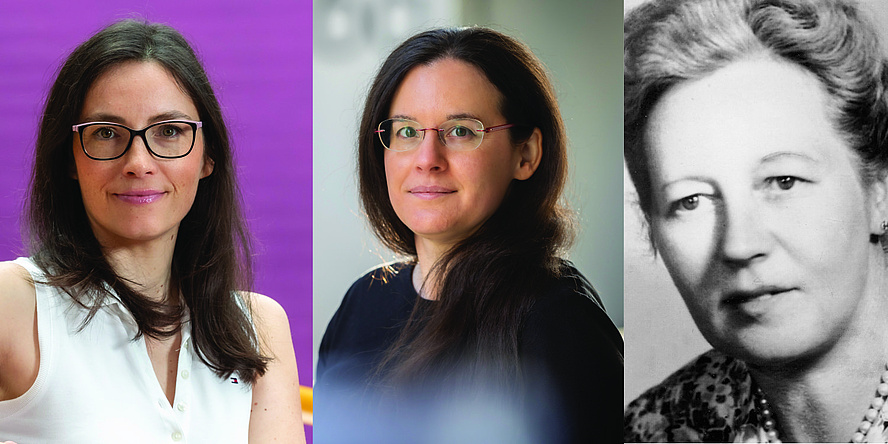Created on 08 March 2024, updated on 25 February 2025.
The archives record the first woman working in science at Graz University of Technology (TU Graz) in the 1936/37 academic year – the Faculty of Mining and Metallurgy at Leoben, where she worked, was then still part of TU Graz. She taught French and Italian. Hedwig Katschinka completed the first doctoral thesis by a woman at TU Graz in 1926 on the subject of “Knowledge of the vapour pressure curves of binary liquid mixtures”. However, the first actual increase in female staff did not occur until 1980. In 1982, Ulrike Wirschnig was the first woman to complete her habilitation at TU Graz – she was authorised to teach petrography and later became the first female associate professor at TU Graz in 1993. The first full professor was Karin Wilhelm at the Faculty of Architecture in 1991.
Today, around 25 per cent of the approximately 2,700 academic staff at TU Graz (including mandated instructors and student assistants) are women. As representatives of the outstanding academic work carried out by women at TU Graz on a daily basis, we would like to highlight a few women researchers and their particular successes:
ERC Grants for exceptional research projects
Physicist Birgitta Schultze-Bernhardt won an EUR 2.2 million ERC Starting Grant in 2020 with her ELFIS project. She also received the prestigious START Prize from the Austrian Science Fund (FWF) in the field of laser optics in 2020. In her two projects, she is investigating the interaction between UV light and matter in spectral ranges that have been hardly researched so far.
Anna Maria Coclite has been able to win two ERC grants for TU Graz. In her SmartCore project, she focused on artificial skin and received an ERC Starting Grant for her work. After completing the highly successful project, she received a Proof of Concept Grant from the ERC for the follow-up project Smart Skin.
In 2023 Sonja Wogrin received a ERC Starting Grant for her project NetZero-Opt “Optimisation and data aggregation for net-zero power systems”. In the coming years, she will focus on innovative data aggregation for decarbonised electricity systems. At the same time, she heads the Institute of Electricity Economics and Energy Innovation, acts as speaker of the newly established research center ENERGETIC and is deputy head of the Field of Expertise Sustainable Systems.
At the end of 2024, Fariba Karimi from the Institute of Human-Centered Computing and Maria Eichlseder from the Institute of Information Security each won an ERC Starting Grant for TU Graz.
Successful women inventors
From 2004 to February 2025, TU Graz recorded invention disclosures or participation in inventions by 113 women scientists.
Gabriele Berg, who is working on the recent research field of human and plant microbiomes at TU Graz, deserves special mention. She has registered nine inventions since 2005, several of which have resulted in patents.
With a total of five registered inventions, Anna Maria Coclite is also successful in this area. As is fluid mechanics scientist Carole Planchette, who is responsible for two inventions in the field of fluid mechanics.
Excellence in teaching
The research of computer scientist Maria Eichlseder is in demand internationally. The crypto algorithm ASCON, which was developed by her working group, was able to prevail in a long-standing international process organised by the US National Institute of Standards and Technology (NIST) and is now the international standard for lightweight cryptography. She is not only one of two women who were the first women graduates to complete their studies at TU Graz sub auspiciis, but also endeavours to promote the next generation of scientists. Her teaching activities, in particular her Cryptography course, were honoured with the Prize for Excellence in Teaching in the 2022/23 academic year.
Other women were also recognised for their excellent teaching in 2023/24 Christina Hopfe with Rober Scot McLeod for „Low Carbon Building Design and Communities“, in 2021/2022 Christina Graf for "Inverse Problems in Biomedical Engineering" and in 2019/20 Melina Amor for Molecular Diagnostics, Isabel Landsiedler for Spanish for Technicians (Level 2) and Barbara Siegmund for Food Chemistry and Technology. Heidrun Gruber-Wölfler was awarded a TU Graz prize for young teachers for her course Pharmaceutical Engineering: Active Ingredients and Processes in 2015/16.

